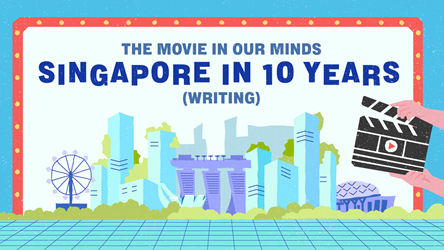The Most Important Change For The Public Service In The Next Five Years
.jpg)
What lessons have you learnt from your favourite TV show or film that you can apply at work?
Send your entry to psd_challenge@psd.gov.sg.
The winning entry will receive a prize worth up to $100. All other published entries will win vouchers worth $30 each. Please include your name, agency email address, agency and contact number.
All entries should reach us by Aug 1, 2016.
.jpg)
Mark Wong, PUB
Policy or white papers generally follow a template: the proposals, the chosen option and justification, and request for approval. By the time the paper percolates up to senior management, it would have been revised so many times that mistakes can get overlooked. I think the number one change is to create a formal section for a dissenting opinion. Get a fresh, critical pair of eyes to review the paper before it goes to the final approving level. The job of the dissenter is to put up their strongest argument for why the proposal should not be adopted, singling out its biggest flaws. This would hopefully catch those “oops, we didn’t think of that” errors.
Congratulations, Mark! You win a session at the Palm Avenue Float Club, so you can emerge refreshed with a clearer mind and better focus.
Woo Wee Meng, MND
The most important change is to instil a “why not” attitude throughout the Public Service. Many of us approach new ideas, initiatives and proposals through the lens of a regulator, considering the potential pitfalls or disamenities, if the majority finds it acceptable, etc. It is a practical set of lens, but we need to start empowering our officers to take some risks. A “why not” mentality would make public officers step outside their agency’s mandate and look for partners from other agencies to support the proposals they see value in. It’s about creating a culture where we find ways to make good ideas viable, rather than seek to reject anything new.
Dan Chong, MOE
In recent years, we have seen awareness ads to inculcate good values, such as civic-mindedness and graciousness, in people. Maybe it is time for the Public Service to also remind public officers about the true values and ultimate purpose of our jobs. Aspects such as ethics and ethos, character and integrity, as well as social responsibility and awareness, can be aligned back into our vision as one way to improve the Public Service.
Alvin Lim, MHA
When an agency makes decisions or reviews policies that impact the public, the use of social networks should be built into the process. Engage regularly on social media, not just when there is a new policy. Be authentic: drop the formal tone and convoluted jargon. But also avoid adopting a hip or unprofessional writing style, such as using expressions like “LOL”. The agency can regularly share about its activities, shifts in its position on issues, the intent behind policies, considerations behind certain decisions, etc. The objective is to share information, gather feedback and concerns, if any, and thus build trust in a long-term relationship with the public.
Tan Siang Meng, MAS
In the army, if a rifle is not working, we draw a new one from the armoury. We do not wait for the armourer to repair it on the spot. We are indifferent to the rifle, as long as it works. We can apply the same approach to the work laptop. In a new IT operating environment, we will use the network computer — nothing is saved on the laptop, and everything is saved on the network. New collaborative software can be rolled out to shift from emails to posts and chats, with messages stored on the network. The benefits? Less downtime, reduced IT maintenance costs and improved productivity and cybersecurity. Proper storage also ensures institutional knowledge is passed on.
Muhammad Haikal Muhammad Ridwan, MOE
I think the most important change that we must make is our mindset. We need a shift from relying on tried-and-tested methods to taking calculated risks, from fault-finding when failures occur to a more holistic analysis to ensure the same mistakes aren’t repeated in future practices. We need to look at the bigger picture, where a particular failure is not viewed in isolation but understood as being part of a series of stepping stones towards potentially effective solutions. Our current climate has a strong emphasis on accountability, but taken too far, it may become restrictive and be even perceived as being merely knee-jerk when used to tackle complex issues. Whilst we still have to be answerable to the public, we should also be open and willing to experiment and try new ideas, especially in the VUCA [volatile, uncertain, complex, ambiguous] environment that we now operate in.
Ong Zhi Li, PA
For a start, I think we can work on managing one another’s impressions and expectations of the Public Service. We have to remind the people that the Government is essentially made up of their own friends and family members, who work hard to make Singapore a better place for all. We have to mitigate the atmosphere of self-entitlement; forge a common understanding and align differences so that citizens and public servants can work together in harmony.
Jenny Wong, MOE
In my opinion, the most important change we can make to improve the Public Service is to make each of us do a compulsory one-day or even one-week attachment at one or more of our key service providers, at least once. This will allow us to see things better from another person’s perspective, walk in their shoes and become more compassionate and empathetic, so we can in turn render services that truly match customers’ expectations.
Joanne Wong, PMO
The most important change is to foster greater ambition and drive in public officers, and move from a culture of compliance to a culture of champions. This happens by developing a nurturing culture that embraces people for who they are, and helps them to grow into all that they can be. When people are fully aware of their strengths and possibilities, they become ambitious, creative and innovative. They will solve problems with ingenuity and initiative, sometimes even before the problem arises. They will be driven to achieve from within, not because others told them to, or because they fear competition from colleagues or other countries, but because they believe in the beauty of their dreams.
In a nurturing environment, they will be motivated to think of the greater good and the community, not because of rules and regulations. They are loved, not for what they did, but for who they are. And being loved begets a loving response of not doing harm to others, of wanting to give back. They would not wonder about their identity, because they know that home is where they belong. Such a public service community would be the ultimate complex adaptive system of champions who love to be brilliant, creative, caring and charming. Against such a motivated and connected community, no problem can stand. The world would be our oyster, and our future paths solid and wide open to dreams.
- POSTED ON
Jul 7, 2016









d1c53633f22f6eceb9b0ff0000fcc945.tmb-tmb450x250.jpg)